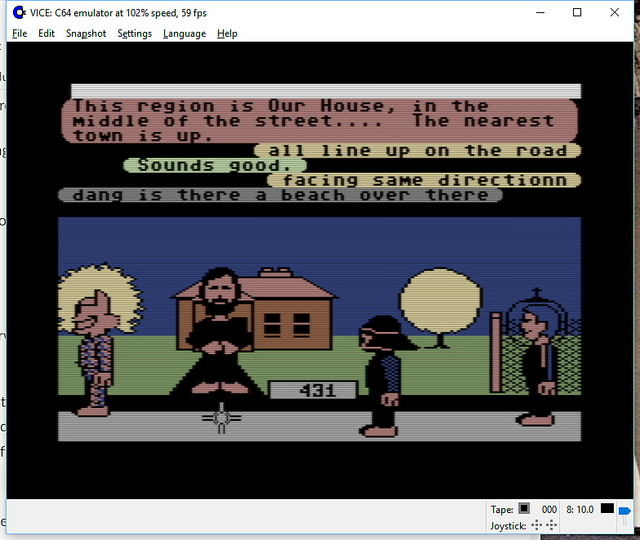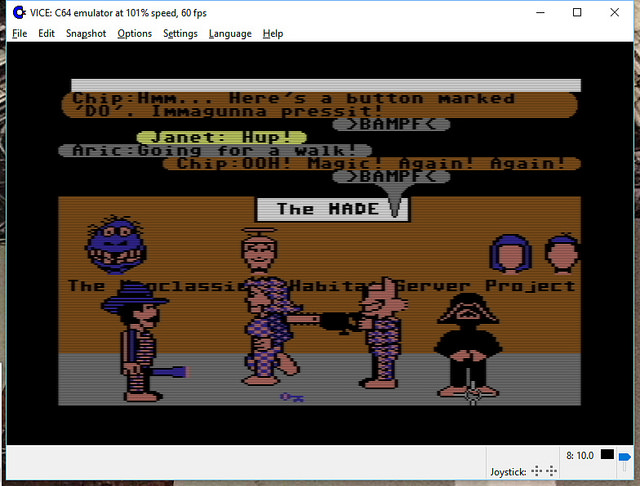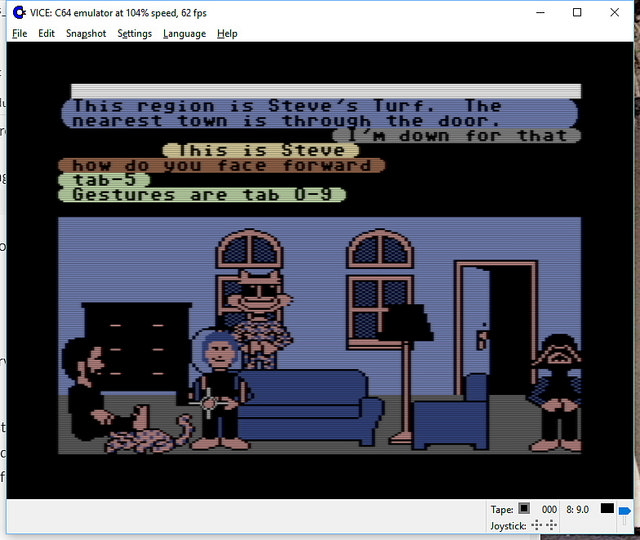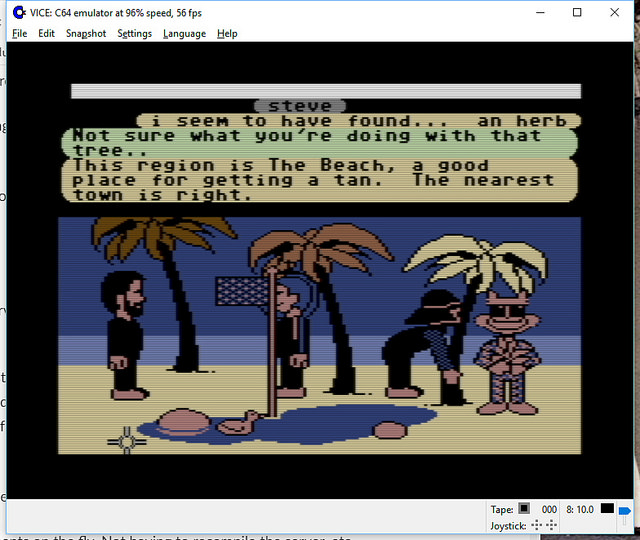Posts filed under "News"
February 7, 2017
Open Source Lucasfilm’s Habitat Restoration Underway


It’s all open source!
Yes – if you haven’t heard, we’ve got the core of the first graphical MMO/VW up and running and the project needs help with code, tools, doc, and world restoration.
I’m leading the effort, with Chip leading the underlying modern server: the Elko project – the Nth generation gaming server, still implementing the basic object model from the original game.
http://neohabitat.org is the root of it all.
http://slack.neohabitat.org to join the project team Slack.
http://github.com/frandallfarmer/neohabitat to fork the repo.
To contribute, you should be capable to use a shell, fork a repo, build it, and run it. Current developers use: shell, Eclipse, Vagrant, or Docker.
To get access to the demo server (not at all bullet proofed) join the project.
We’ve had people from around the world in there already! (See the photos)
http://neohabitat.org #opensource #c64 #themade


April 29, 2014
Troll Indulgences: Virtual Goods Patent Gutted [7,076,445]
 Another terrible virtual currency/goods patent has been rightfully destroyed – this time in an unusual (but worthy) way: From Law360: EA, Zynga Beat Gametek Video Game Purchases Patent Suit, By Michael Lipkin
Another terrible virtual currency/goods patent has been rightfully destroyed – this time in an unusual (but worthy) way: From Law360: EA, Zynga Beat Gametek Video Game Purchases Patent Suit, By Michael Lipkin
Law360, Los Angeles (April 25, 2014, 7:20 PM ET) — A California federal judge on Friday sided with Electronic Arts Inc., Zynga Inc. and two other video game companies, agreeing to toss a series of Gametek LLC suits accusing them of infringing its patent on in-game purchases because the patent covers an abstract idea. … “Despite the presumption that every issued patent is valid, this appears to be the rare case in which the defendants have met their burden at the pleadings stage to show by clear and convincing evidence that the ’445 patent claims an unpatentable abstract idea,” the opinion said.
The very first thing I thought when I saw this patent was: “Indulgences! They’re suing for Indulgences? The prior art goes back centuries!” It wasn’t much of a stretch, given the text of the patent contains this little fragment (which refers to the image at the head of this post):
Alternatively, in an illustrative non-computing application of the present invention, organizations or institutions may elect to offer and monetize non-computing environment features and/or elements (e.g. pay for the right to drive above the speed limit) by charging participating users fees for these environment features and/or elements.
WTF? Looks like reasoning something along those lines was used to nuke this stinker out of existence. It is quite unusual for a patent to be tossed out in court. Usually the invalidation process has to take a separate track, as it has with other cases I’ve helped with, such as The Word Balloon Patent. I’m very glad to see this happen – not just for the defendant, but for the industry as a whole. Just adding “on a computer [network]” to existing abstract processes doesn’t make them intellectual property! Hopefully this precedent will help kill other bad cases in the pipeline already…
April 14, 2011
We’re at it again and we’re hiring…
Chip has created the Nth generation of his massive-scale real-time server architecture (the spiritual descendent of Habitat) and we think the time is right for mobile/social games to go multiplayer! So we’ve gotten the band back together, and you can join us!
FUDCorp Job Openings
Real-Time Game Server Programmer, SF Bay Area
About us: a still-stealth start-up with a groundbreaking mobile/gaming platform that will reshape social games/apps. Get in on the ground floor with world-class founders and established technology. If you know us, you what we’ve built since the earliest days of online play.
Your role:
- Writing server-side Java code for an original massively multiplayer mobile online game
- Writing/maintaining testing frameworks (mostly in JavaScript for Node.js) for rapid development and massive scale performance evaluation
- This is a contract position, with potential to join our full-time team
Job Requirements:
- Immediate Availability. Our recent successes (partners and funding) means we need more help immediately!
- San Francisco Bay Area. With live meetings at least weekly, increasing over time.
- Minimum 3 years as a professional Java programmer working on client-server applications in a small, decentralized team.
- Strong Linux/Unix skills: shell scripting, command line tools, server administration, etc.
- Big plus: server-side JavaScript/ECMAScript skills, especially with Node.js
- Big plus: experience with Amazon EC2, and optimizing server features for automatic deployment
- Big plus: previous work with implementing social games, such as taxonomies, economies, abuse mitigation, and social issues
- Big plus: experience with iPhone or Android app development
Please send resume and contact info to jobs@fudcorp.com.
July 7, 2010
RealID and WoW Forums: Classic Identity Design Mistake
Update #3, July 14th 4pm PST: GamePro interviewed Howard Rheingold and myself for a good analysis piece in which I add some new thoughts, including a likely-to-be-controversial comparison to a certain Arizona state law…
Update #2, July 9th 1pm PST: KillTenRats.com just posted an email interview on this topic that I did for them yesterday. There some potentially useful business analysis in there, and more specific suggestions, even if it now feels a bit like residual heat from a flamethrower fest…
Hey Blizzard! I’m a freelance consultant! Just sayin’ :-)
Update #1, July 9th 10am PST: Blizzard has had a change of heart and will not require RealID for forum postings. This is a big win both for the community, and I believe, for Blizzard! The post below remains only as a historical footnote and perhaps a cautionary tale…
Talk about a crapstorm…
Here’s my latest tweet:
@frandallfarmer Quit World of Warcraft. New policy of RealID for forums - stupid beyond belief. #wow #fail #realid #reputation #identity #quit #copa #coppa
That’s too terse, given the magnitude of the error that Blizzard is making, so here’s a longer post…
Identity as Defense?
Blizzard has announced that the upcoming Starcraft II forums will require posts to be attributed to the user’s read-life name, taken from their billing information. As if this wasn’t bad enough, they’ve also said that the World of Warcraft boards will start this requirement soon as well.
They also announced a posting rating system, which sounds like they haven’t read anything from Building Web Reputation Systems, or at least about the massive disasters from combining real names and social ratings at places like Consumating.com, but that’s a post for a different blog. :-)
The idea Blizzard has is a common initial misconception – that people will “play nice” if they have to show their real names to each other. I’m sure they are using Facebook as an example – I often do this in my consulting practice. There is no doubt that Facebook users are better behaved in general than their YouTube counterparts, but the error Blizzard made is to assume that their player relationships are like those of Facebook.
This is critical misconception, and the community is responding with the longest threads in WoW history, and blog posts everywhere.
The Misconceptions
There are a lot of valid (and invalid) complaints and fears about this change – I’m not going to list them all here. What I want to do is point out the fundamental flaws in this model, for WoW in particular.
My 35+ years in building online communities (with and without RealID-like systems) screams out that Blizzard is going to be very, very disappointed with the results of this change. Specifically:
1: Names != Quality
Though this is nominally meant to improve the quality of the community, by civilizing conversation through revealing true names, it won’t because the interesting conversation will simply stop or move elsewhere. Many women (including a Blizzard employee) have already clearly stated that they won’t post anymore. This kind of thing has happened many times before as communities move from Yahoo Groups to Ning or wherever. As John Gilmore said:
“The Net interprets censorship as damage and routes around it.”
2: Brain Drain or “NetNews died for our sins”
Some say that getting rid of (bad) people is what Blizzard wants, so point #1 is a plus. But hold on there! Just owning the problem of driving customers into silence or away doesn’t help either.
Consider the case of Usenet/Netnews, where all the great internet community was until 1994 – when the environment became inhospitable to types of discussions the natives wanted to have, and they left en masse to form private mailing lists, and eventually webblogs. The assertion that a community of those who will reveal their names is somehow better does NOT hold up to any reasonable scrutiny (see next point…)
A shocking number of people who leave will be amonst the best users Blizzard has – and that could kill the quality of content on the forums, just as happened with NetNews. Sure, less trollish posts, but less great posters too. I’m betting there are less trolls to remove than there are good users who’ll leave/not post.
3: Facebook Status != Message Board Participation
I approve my Facebook Friends. None of them are trolls/spammy – or if they are, I block their events and no harm done. All of them can see my real name, status postings, comments, and other personal information. If it turns out I’m sharing too much, I can turn down the disclosure. It’s all optional.
Message boards are public. Readable by God, Google and Everyone. This model requires me to disclose sensitive information to everyone. Completely different.
Here’s the deal. We’re talking gaming here. People will get pissed at each other for stolen kills, breaking alliances, and the price of components – and they want to – no, they need to – have a safe place to express this, to play.
This is my spare time. It’s no other player’s business where I work, where I live, who my family is. Just as it’s no business of my boss, who knows how to Google my name, what I dedicate my off-hours energy to. The Facebook-analogy of Real Identity = Quality Contributions falls apart when applied Gaming. Google + Friends + Foes + Bosses + My Real Name + The fact I have 6 80th Level Characters = Too Much Information.
Facebook does NOT leak this much information, and the US Senate is looking into their privacy practices.
This has also happened many times before. Every time someone new to the net starts a LiveJournal, they don’t know about friends locking until they get asked into the boss’s office to discuss something they read on the journal while ego-surfing. This is how many LiveJournals get owner-deleted!
It is completely unreasonable to expect that people will understand the risks of using their real names on a message board – and if they DO understand, I contend that most people won’t bother posting anything at all.
In short:
- The trolls now get more information to harass
- The best players will leave
- The casual players will panic when they realize that their private-time activity is now public.
This is lose-lose. The worst kind of change. The only upside I see is the ability to lay off board moderation staff as traffic (good and bad) plummets.
An Alternative Everyone Can Live With
There was/is an alternative – described in the Tripartite Identity Model post from two years ago: Implement Nicknames!
Sure, have a top-level social identity, but present it as user-controlled Nickname and allow users to share a variant of their real name – but don’t require it! Sure, if the Nickname is the same as their RealID, feel free to show an indicator, like Amazon.com does with their Real Nametm markers. Allow users to reveal what they wish – even provide incentives for them to do so, but don’t bind full disclosure on them. Even Facebook doesn’t do this!
It’s never too late.
P.S.: I can’t stop being amazed – Asking for help on a forum requires disclosing your real name to God, Google, and Everyone? Come on! You’ve got to be kidding!
April 27, 2005
Chip's A Yahoo!
One of the odder side effects of working closely with somebody else for nearly 20 years, which you only discover by not working with them for a while, is that a small but important fraction of what you know ends up being actually stored in the other person’s brain. I encountered this strange phenomenon in early 2003, after our most recent startup, State Software, ignominiously cratered in the face of our principal investor’s feckless amateurism as a venture capitalist. Suddenly faced with the need to get real jobs to put food on the table, our heroes were forced to take separate paths. Randy (after some exciting adventures that, as Michael Flanders says, we’ll tell you all about some other time) landed at Yahoo!, and I wound up in my present job at Avistar. It was after settling into the new job that I experienced the curious and disconcerting sensation of not being able to access some of the stuff I knew I knew, as it was in a different head 15 miles or so to the south. (I’ll let Randy speak for himself as to whether he experienced any analog to this weirdness.)
Thus it is that I am thrilled to announce that after next week I shall put down my hammer, tweezers, astrolabe, and other code refactoring tools at Avistar and become instead a fellow Yahoo! alongside my long-time collaborator.
Now nobody will be safe.